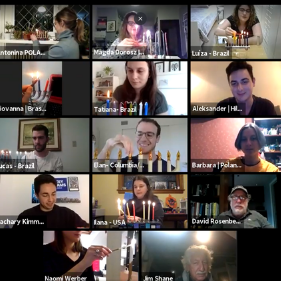Cultivating global Jewish connection when travel is paused

From Rio de Janeiro, Brazil to Warsaw, Poland; from Chicago, Ill. to the Upper Galilee in Israel, Hillels are all over the globe— and they’re connecting with each other more than ever.
“It’s the beauty of a global movement,” says Sara Teichman, Hillel International’s Vice President of International Strategy and Advancement.
With a network of over 550 campuses, spanning four continents and 20 time zones, Hillel brings together Jews from all around the world. And even though Hillel has always been about enriching students’ connections to Judaism—no matter where they are—this year has provided a unique opportunity for global engagement.
By using online platforms like Zoom, Hillel International has strengthened its global programming efforts, connecting Jewish students thousands of miles apart. And for all those travel restrictions, it’s certainly been a very global year for Hillel.
“We can’t reach each other in person, but COVID has presented us with an opportunity to be more global than ever before,” Teichman said, adding that the opportunity to connect online has been somewhat of a blessing in disguise.
This year, Hillel International has fostered connections between Hillel Poland, Hillel Rio and Hillels around the U.S., hosted global virtual Chanukah celebrations with Jews around the world, launched the first ever Global Torah Salon, and continued to host the Hillel Global Assembly, just to name a few examples.
During three different nights of Chanukah, Hillels from eight different countries and four continents gathered over Zoom to celebrate the holiday and light Chanukah candles.
Students from Hillel Rio in Rio de Janeiro, Brazil, Hillel Tel Chai in the Upper Galilee of Israel, Hillel Warsaw in Poland, and other Hillels shared stories of their favorite personal Chanukah memories with each other.
For some, the celebration was made even more meaningful because it allowed them to connect with more Jews then they would have ever been able to in their hometown.
“I live in a small town close to Rio where the whole Jewish community is me, my mom and my sister,” Lucas from Hillel Rio said during the seventh night of Chanukah celebration. “I feel really glad to have this opportunity to celebrate this year. I feel more connected to Judaism… and it represents a lot to me.”
The celebrations were streamed live on Hillel International’s Facebook page, and included Hillels from the U.S. as well, including Northwestern Hillel and Columbia/Barnard Hillel.
“The miracle of putting our menorah out front is to say, ‘wherever we are, we are going to light our Chanukah candles together,’” Jessica Lott, Northwestern Hillel’s Campus Rabbi, said. “And we’re going to say to one another around the world, ‘I see you; I celebrate you; I love you; and our celebration together is the miracle of Chanukah.”
Esther Abramowitz, Hillel International’s Director of Global Israel Experiences, who helped organize the global Chanukah gatherings, said that the idea probably wouldn’t have happened if it weren’t for the pandemic. Now, she looks forward to holding the global holiday celebrations well after the pandemic, and has already started planning for a global Tu B’Shevat celebration.
“I think the value in connection is for the student in Rio to know that they’re not alone,” Abramowitz said. “It’s for people to know that [they] might eat different foods and have different traditions or stories, but their stories connect.”
Meanwhile, in Israel, Hillel helped organize nearly 20 small Thanksgivings dinners, with groups small enough to follow COVID guidelines, and Israelis had an opportunity to learn about an American tradition they did not know much about, Abramowtiz said.
Alongside the global gatherings, Hillel International has also launched the Global Torah Salon, where students, staff, and supporters from around the world gather together online to learn Jewish texts.
“I got goosebumps as we said the Shechiyanu blessing together,” Abramowitz said of the first session of the Torah Salon. “The sound of our voices from all over the world blessed and sanctified the moment, even on Zoom!”
All of this global connection is part of achieving one of Hillel’s greater missions—that, no matter where they may be or what the state of the world is, students see themselves as part of an interwoven Jewish tapestry.
Before the pandemic Hillel Poland routinely hosted cohorts of students from Hillels like Stanford and Columbia/Barnard in Krakow and Warsaw during alternative spring break trips. And despite the halting of travel, Hillel Poland has continued to foster connections with Hillels around the world.
This year Hillel Poland and Hillel at Florida International University organized a series of combined Zoom gatherings where students reflected on their local Jewish traditions, experiences, and how they can play an active role in the future of the Jewish world.
Magda Dorosz, Executive Director of Hillel Warsaw, said global connections are especially significant for Hillel Warsaw because most of today’s Jewish community knows Warsaw for its Jewish past, but not its Jewish present.
“A lot of people don’t come with the understanding of the current Jewish community here,” Dorosz said. “When they hear there’s a Hillel [in Poland], they are very surprised to hear about the vibrant young Jewish community. It influences the way they think about Polish Jewish life.”
Hillel Rio, another frequent host of alternative spring break trips before the pandemic, is also continuing to connect with Jews around the world over Zoom.
“For us it’s magic because it’s like being part of a chain,” Marcia Kelner Polisuk, Director of International Advancement and Senior Advisor for Latin America, said. “Students want to meet other students that have the same mashugana mother, mashugana parents, and know what meshuganas is about.”
Abramowitz echoes these sentiments: “To be global means connection — it’s realizing that you’re part of something larger than yourself. It’s realizing that you have family all over the world.”